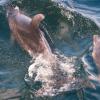Marine protected areas and the coral reefs of traditional settlements in the Exumas, Bahamas
This paper is about modeling the perceived social impacts of three proposed marine protected areas (MPAs), each designed to protect coral reefs. The paper argues that shared perceptions of these impacts have resulted in different community-level responses to these MPA proposals. The study is uniquely situated in the Bahamas where the government has approved setting aside 30 No-take MPAs (including three under study here) to protect the coastal marine environment. The paper is based on 572 interviews conducted during eight field trips with members of six traditional settlements in the Exuma Islands and Cays in the central Bahamas. Overall, 34% of the census population of these settlements was interviewed at least once. Key findings are that an MPA can impact in either positive or negative ways (a) community agency by the process of siting, (b) community resilience by eliminating or supporting some components of their traditional adaptations to social and natural environments, and (c) community identity by precluding or protecting customary marine access. MPA impacts to local communities determine whether those communities will support or resist proposed MPAs.
Area of Interest: Bahamas
Year: 2007




